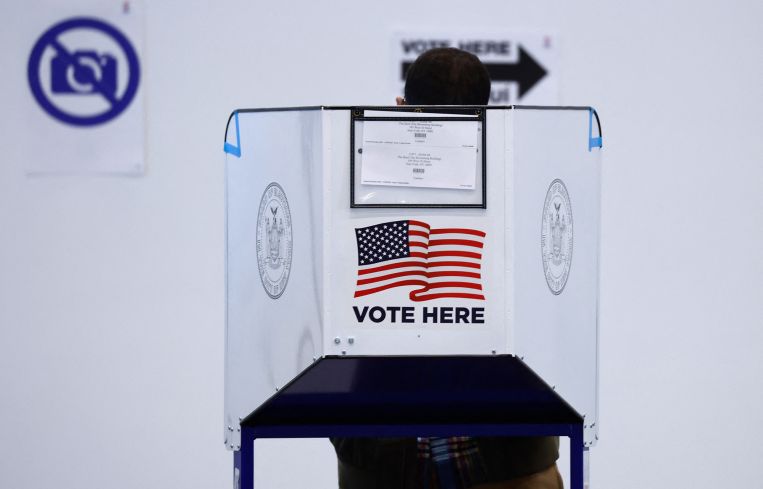City Board of Elections Approves Controversial Housing Ballot Questions
By Mark Hallum September 9, 2025 3:08 pm
reprints
In a controversial move, the New York City Board of Elections (BOE) voted Tuesday to approve ballot proposals that could reshape how affordable housing gets made in the city.
The decision over whether the New York City Council, the City Planning Commission (CPC) or the Board of Standards and Appeals (BSA) will approve rezonings for apartment buildings now falls to the voters, who will be faced with three questions on their ballots in November.
The City Council previously asked the BOE to reject the questions — known as Proposals 2, 3 and 4 — drafted by the Charter Revision Commission, claiming that it would pass power over to unelected officials without offering clear descriptions to voters of how decisions will be made.
“Today, the Board of Elections upheld their role in the democratic process and confirmed that five potential reforms to the New York City Charter will appear on the ballot this fall,” Richard Buery, chairman of the Charter Revision Commission, said in a statement. “This November, New Yorkers will have the opportunity to vote on important proposals to address our housing crisis and boost participation in local elections.”
City Council Speaker Adrienne Adams vowed to challenge the decision.
“Trying to deceive voters into giving away their power in a democracy through misleading ballot proposals that hide their true impact is fundamentally undemocratic,” New York City Council spokesperson Julia Agos said in a statement. “Mayor Adams’s commission could have offered honestly worded ballot proposals to give voters the choice to make informed decisions, but it chose not to and instead is attempting to trick voters with buzzwords and slogans.”
Part of the controversy surrounding the proposals derives from whether the BOE had the authority to block ballot questions previously certified by the city to begin with. This question led government watchdog group Reinvent Albany to assert its legal interpretation that the BOE lacked the power to remove certified proposals from the ballot.
“If you do decide to act illegally, the courts will rule against you and the questions may or may not make it on the ballot,” Reinvent Albany leaders said in the letter issued to the BOE Monday. “Unfortunately, your actions are sure to destroy the Board’s reputation and broadly fuel public cynicism and mistrust in New York’s government, including the City Council, at a time when democratic norms and the law itself are under assault.”
Laurence Laufer, an attorney for YES on Affordable Housing Campaign, confirmed that the BOE does not have the authority to reject a ballot proposal confirmed by the city clerk.
“I have found no credible legal argument that would support the board rejecting the ballot proposals,” Laufer said. “There isn’t even a close case.”
The reforms that the ballot measures would implement could become templates for other municipalities, with New York City being the first to make such changes to procedures involving housing and its applicable zoning approvals, according to Annemarie Gray, Open New York’s executive director.
“There are real national implications to these ballot measures,” Gray told CO. “This is the first time a major American city is putting meaningful, systemic changes to the politics of housing growth on the ballot. A decisive victory will make history, and prove that blue cities can actually tackle the housing affordability crisis. So there are a lot of eyes on New York right now.”
Love it or hate it, a change to the city charter needs to happen considering the urgency of the housing crisis, and the fact that many developers find the current Uniform Land Use Review Process (ULURP) too clunky to navigate, according to Mitch Korbey, the chair of the Land Use and Zoning group with law firm Herrick.
“What you have to understand is that there are many projects that don’t even begin because of the barrier that a very lengthy public approval process creates, and so you have folks that aren’t even able to get started because they are aware of the hyper-localism involved in some of these challenges,” Korbey told Commercial Observer. “The delays, the holdups and the failure to move forward are often the result of very local challenges.”
Korbey also argued against the City Council’s point that the deciders in these projects will no longer be elected officials, saying that all the officials in the CPC and BSA are appointed by elected leaders such as the mayor. That includes the city clerk, who is appointed by the City Council.
Debate surrounding the ballot questions led Mayor Eric Adams to bring together City Council leaders and members of the Charter Revision Commission last week, where they debated whether the ballot questions were unclear. In the end, the Council asked the BOE to remove the proposals from the ballot.
The Charter Revision Commission argued in turn that to kill the ballot initiatives would remove New Yorkers from the democratic process of deciding where authority lies in the midst of the housing crisis, and that it would be an unprecedented move for the BOE to block a measure submitted by a charter revision commission.
Adams has focused his administration on fast-tracking housing through a series of rezonings, including the City of Yes and the Midtown South Mixed-Use Plan. Adams has also argued that the traditional route for approvals through community boards, borough presidents’ offices and the City Council was too time-consuming and costly for developers.
Thanks to all this, New Yorkers will have a lot to ponder at the polls in November’s general election, including choosing New York City’s next mayor.
Queens state lawmaker Zohran Mamdani continues to hold a convincing lead in the mayoral polls, while former Gov. Andrew Cuomo trails behind and Curtis Sliwa and the incumbent Adams bring up the rear.
Mark Hallum can be reached at mhallum@commercialobserver.com.



